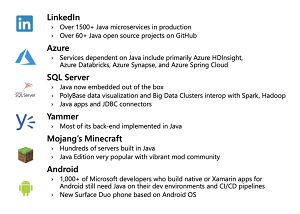News
Microsoft Furthers Big Java Push with OpenJDK Port
Microsoft is furthering its big Java push -- marked by last year's debut of the Java Engineering Group in its Developer Division -- by porting OpenJDK for Windows 10 on Arm (AArch64)-based devices.
As part of the first phase of the in-progress port, Microsoft will push its development work -- in collaboration with Red Hat -- upstream to the OpenJDK project. Microsoft last year signed up to join the project, a free and open-source implementation of the Java Platform, Standard Edition.
The Windows 10 work targeting ARM64 architecture -- known for energy efficiency and ideal for battery-powered devices -- takes Microsoft beyond its initial cloud-based focus for Java development, which was evidenced by its acquisition of jClarity last year in order to optimize Java workloads on the Azure cloud.
"While optimizing Java for Azure remains one of our core goals, it is crucial to share that we are involved in other initiatives to make the Java platform even better on areas besides the Cloud," said Bruno Borges, principal program manager, Java Engineering Group, in a June 24 blog post announcing the port.
Borges highlighted the company's investment in Java with the following graphic pulled from a presentation at the recent Build developer conference by Martijn Verburg titled "Modern Java for Cloud Developers."
 [Click on image for larger view.] Java at Microsoft (source: Microsoft).
[Click on image for larger view.] Java at Microsoft (source: Microsoft).
That Java investment prompted the company to become more involved in Java, Borges said, with the new Java Engineering Group starting to push beyond the cloud with small projects, patches and other initiatives, culminating in the new ARM64 for Windows 10 port.
"Developers can start developing Java on Windows 10 ARM64 compatible laptops, like the Surface Pro X, with the core Java extensions on the recently-announced Visual Studio Code for Windows ARM64 along with traditional tools like Apache Maven, Gradle, and others -- check out the VS Code for Java May Update."
Technical details of the port can be found in a message to the OpenJDK project from Monica Beckwith, who led the porting effort.
Developers can try out the port with an Early Access binary housed in the project's GitHub site.
About the Author
David Ramel is an editor and writer at Converge 360.